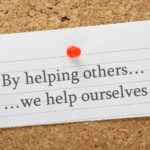Downloadable Transcript: Practice Wavering 2
There are two aspects to this question, your practice for yourself, and practicing for others. To me, it’s almost like they are concurrent also sequential steps in the journey to enlightenment. It takes these two legs to move toward enlightenment. In this video we’ll be looking at what it means to put the practice in the center of your life. Then we’ll contrast it with what it looks like when you aren’t putting the practice in the center, even though you might be chanting. This is when your practice might be wavering.
The Practice for Yourself
Here are five examples how your life appears when the practice is in the center of your life.
1. When a problem or obstacle arises, you start by chanting first, rather than trying to solve it first through getting advice, strategizing etc. This is when you start by going to the Gohonzon with everything that happens, no matter how big or small the issue.
2. Another aspect of putting the practice in the center of your life is to practice morning and evening, as well as attend and contribute to meetings without begrudging the time. It becomes a way of life.
3. If you have practiced for a while, instead of going to meetings just for what you can get out of it, you also go to help others understand Buddhist teachings and to show them how to apply the practice to solve their problems through encouragement, discussion, experiences and presentations.
4. The practice is in the center of your life when you do your absolute best to create value in everything you do by taking the time to do it well. You know that your daily life is your practice as well as the time you spend chanting.
5. When issues come up in daily life you apply some of the Buddhist teachings to resolving them. You know that blaming others or your environment is not the Buddhist way, that your situation comes from the inside of you to manifest in the outer world.
For ex., Sylvia found herself being isolated at work. She chanted about it and saw that this had been the situation much of her life. But now she had learned about oneness of self and the environment and so she understood that this situation came from inside her. She examined her behavior and realized she wasn’t saying hello to the others or asking about their lives. She resolved to change that behavior and once she did it wasn’t long before she was included as part of the group.
How it Looks When Practice is at the Periphery of Your Life?
The practice is at the periphery of your life when:
1. Other things have priority over morning practice.
2. You find yourself using excuses to avoid chanting or going to meetings.
3. Other activities consistently have priority over meetings
4. You quit when you run into problems or when things don’t work out the way you expected.
5. You only chant and connect with practitioners when your life isn’t working.
6. You are resenting something a leader is or is not doing and withdrawing because of it. One long term practitioner commented that if she had stopped going to meetings because of being irritated with a leader she would have stopped practicing years ago.
7. You’re blaming something outside yourself such as other people or the environment for your situation.
Your practice can waver without your even being aware of it, so periodically its good to review what you have been doing.
Your Practice for Others
Sometimes people do chant regularly, but don’t really do the work of practicing for others. Others leap right in.Tsunesaburo Makaguchi was very clear about the importance of the practice for others in our own lives. He says,
“While there is no dispute about the fact that someone who believes in the Mystic Law will have their prayers answered and realize benefit, this does not constitute bodhisattva practice. There is no such thing as a self-centered Buddha who simply accumulates personal benefit and does not work for the well-being of others. Unless we carry out bodhisattva practice we cannot attain Buddhahood.” Heritage of the Ultimate Law of Life, p. 107
There is a major shift that occurs in your life when you take up the practice for others, chanting for them, introducing new people and supporting them in the practice. In The Wisdom of the Lotus Sutra V. 5, p. 23, Daisaku Ikeda says,
“When we devote ourselves to the happiness of others, when, of our own free will, we undertake the struggle of a bodhisattva, the immense force of life without beginning or end wells up in our being. The eternal life of the Buddha permeates our being like a rising tide. Then there is no way we cannot dramatically change our lives for the better. “
When we begrudge the time we give to Buddhist activities, without realizing it, we’re just inhibiting our own growth. These activities exist for our growth. We are not doing them for the organization. Following the guidelines given to us by the three presidents will place you firmly on the evolutionary fast track.
I’ve experienced this myself and heard many experiences of people who care for others and support their growth. They find that their own lives take a great leap forward and they feel they are moving forward at light speed. They have discovered that the more effort they put into activities, the better things go in their lives. I’ve experienced this myself.
Caring for others is introducing someone new to Buddhism, helping newbies understand the concepts or learn gongyo, encouraging them and sharing your experiences. It means taking a friend and making a home visit to chant and encourage a practitioner who is struggling with an obstacle or challenging life situation.
Summary
Today we looked at what it looks like when you are firmly grounded in the practice.
Then we analyzed what it looks like when your practice is wavering.
And finally showed that it is important to be aware because you can waver without being aware of it.
In the next vlog we’ll look at the process of human revolution and how you can address these issues through doing your human revolution.
Here are some other references you might like.
1. Faith Slipped? 6 Ways to Get Back on Track. https://wp.me/p3V1J9-UA2.2.
2. Know the Warning signs You Are Battling Fundamental Darkness? https://wp.me/p3V1J9-T8
3. Do You Know How to Refresh Your Practice? https://wp.me/p3V1J9-Ou
These Url’s are listed in the downloadable transcript under each video on my website and, onYou tube on the end screen.
Comments
I want to hear from you. Do you have other ideas on how either putting the practice in the center of your life looks or other ideas on how it looks when you aren’t. I’m always interested in topic ideas and hearing what you all are thinking.
Thanks for listening and I’ll see you in two weeks.



Great presentation! Good graphics! Useful and helpful references. Wish I could do this good at meetings.
excellent. I would like to hear about how can I wash out my financial karma. Thanks
Thanks for the topic. I’ll cover it soon.
Ma’am, I’ve come to see the practice as a refuge and a guide, and many times catch myself thinking, well, whatever it is, the practice will help me. This is a change/improvement from ‘let me chant and see if it will be solved’.
About wavering – you said we had to approach the practice first and not look for other solutions. I do practice, but I also talk to friends and family for ways to do something, or make a decision. Is that what you meant? Recently, I took a huge decision and I can say I chanted for courage, direction, decision, and also spoke to close people to bounce ideas and arguments off them. I don’t see this as wavering.
As for practising for others, I do chant for their well-being. I mention the practice whenever I think it will be welcomed/not mocked. I’m not a religious or evangelical person by nature so I find it rather difficult to spread the word of NMHRK as a mission. I have gone for a couple of meetings but find the person in charge comes on very, very strong and I feel uncomfortable. It upsets me when I read or hear that being missionary about the practice/SGI will bring faster results or that my practice is not complete without this. In fact, in my 10 months of practice, this is the point which distresses me every time I hear it.
Of course you can talk to friends or family. When you go to the Gohonzon with the issue, You may well find ideas you wouldn’t have gotten otherwise. Going to the Gohonzon with your concern first just means you will get the wider universal view before taking steps forward. Expecting other people to solve the problem for you rather than relying on your inner universal connection would be wavering. I don’t see what you did as wavering. You were chanting about it and getting as many ideas as you could.
You are contributing in your own way and talking with people you think might be interested. That’s fine. Just be yourself. In meetings everyone has an opinion. But don’t feel pressured by others points of view.